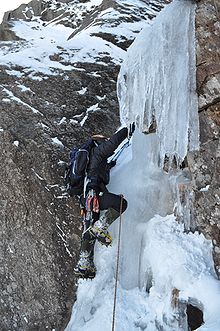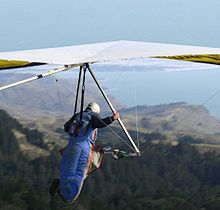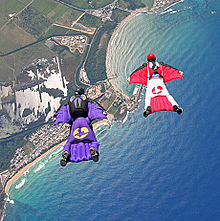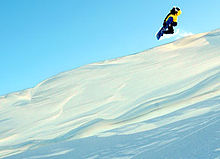- Extreme sport
-
 Wave jumping wipeout. While attempting a forward loop in overpowered storm conditions off the coast of Cantabria, Spain, windsurfer Justin Wheeler gets catapulted into a high double flip.
Wave jumping wipeout. While attempting a forward loop in overpowered storm conditions off the coast of Cantabria, Spain, windsurfer Justin Wheeler gets catapulted into a high double flip.
An extreme sport (also called freesport, action sport, and adventure sport) is a popular term for certain activities perceived as having a high level of inherent danger.[1][2][3] These activities often involve speed, height, a high level of physical exertion, and highly specialized gear or spectacular stunts.[1]
The definition of an extreme sport is not exact — for example, although studies show that road cycling ranks as the sport with the highest number of injuries,[4] it is not considered an extreme sport because it is not counter-cultural[citation needed]. The term's origin is also unclear, but it gained popularity in the 1990s when it was picked up by marketing companies to promote the X Games.
While use of the term "extreme sport" has spread far and wide to describe a multitude of different activities, exactly which sports are considered 'extreme' is debatable. There are however several characteristics common to most extreme sports.[5] While not the exclusive domain of youth, extreme sports tend to have a younger-than-average target demographic. Extreme sports are rarely sanctioned by schools.[citation needed] Extreme sports tend to be more solitary than traditional sports .[6] (Rafting and paintballing are notable exception, as they are done in teams.) In addition, beginning extreme athletes tend to work on their craft without the guidance of a coach (though some may hire a coach later).
Activities categorized by media as extreme sports differ from traditional sports due to the higher number of inherently uncontrollable variables. Athletes in these activities compete not only against other athletes, but also against environmental obstacles and challenges. These environmental variables are frequently weather and terrain related, including wind, snow, water and mountains. Because these natural phenomena cannot be controlled, they inevitably affect the outcome of the given activity or event.
In a traditional sporting event, athletes compete against each other under controlled circumstances. While it is possible to create a controlled sporting event such as X Games, there are environmental variables that cannot be held constant for all athletes. Examples include changing snow conditions for snowboarders, rock and ice quality for climbers, and wave height and shape for surfers.
Whilst traditional sporting judgment criteria may be adopted when assessing performance (distance, time, score, etc.), extreme sports performers are often evaluated on more subjective and aesthetic criteria.[7] This results in a tendency to reject unified judging methods, with different sports employing their own ideals[8] and indeed having the ability to evolve their assessment standards with new trends or developments in the sports.
Contents
Classification
While the exact definition and what is included as extreme sport is debatable, some attempted to make classification for extreme sports. In 2004, author Joe Tomlinson classified extreme sports into those that take place in air, land, and water,[9]
Nine air sports are mentioned including: BASE jumping, bungee jumping, gliding, hang gliding, high wire, ski jumping, sky diving, sky surfing, and sky flying.
Eighteen land sports including: indoor climbing, adventure racing, aggressive inline skating, BMX, caving, motocross, extreme skiing, freestyle skiing, land and ice yachting, mountain biking, mountain boarding, outdoor climbing, sandboarding, skateboarding, snowboarding, snowmobiling, speed biking, speed skiing, scootering and street luge.
Fifteen water sports including: barefoot water skiing, cliff diving, free-diving, jet skiing, open water swimming, powerboat racing, round the world yacht racing, scuba diving, snorkeling, speed sailing, surfing, wakeboarding, whitewater kayaking, windsurfing, and kitesurfing.
History
The origin of the divergence of the term "extreme sports" from "sports" may date to the 1950s in the appearance of a phrase usually, but wrongly, attributed to Ernest Hemingway.[10] The phrase is
- "There are only three sports: bullfighting, motor racing, and mountaineering; all the rest are merely games."
The implication of the phrase was that the word "sport" defined an activity in which one might be killed. The other activities being termed "games". The phrase may have been invented by either writer Barnaby Conrad or automotive author Ken Purdy.[10]
In recent decades the term extreme sport was further promoted by X Games, a multi-sport event created and developed by ESPN.[11][12] The first X Games (known as 1995 Extreme Games) were held in Newport, Providence, Mount Snow, and Vermont in the United States.[13][14]
A history of the sports was published in 2004. Amped: How Big Air, Big Dollars and a New Generation Took Sports to the Extreme. The book provided an overview of the history, culture, and business of the sports and included interviews with athletes, company owners, and marketers.
Marketing
Some contend[15] that the distinction between an extreme sport and a conventional one has as much to do with marketing as with the level of danger involved or the adrenaline generated. For example, rugby union is both dangerous and adrenaline-inducing but is not considered an extreme sport due to its traditional image, and because it does not involve high speed or an intention to perform stunts (the aesthetic criteria mentioned above) and also it does not have changing environmental variables for the athletes. Demolition derby racing, predominantly an adult sport, is not thought of as 'extreme' while BMX racing, a youth sport, is.[citation needed]
One common aspect of an extreme sport is a counter-cultural aura — a rejection of authority and of the status quo by disaffected youth. Some youth of Generation Y have seized upon activities which they can claim as their own, and have begun rejecting more traditional sports in increasing numbers.[6]
The definition of extreme sports may have shifted over the years due to marketing trends. When the term first surfaced circa the late 1980s/early 1990s, it was used for adult sports such as skydiving, scuba diving, surfing, rock climbing, snow skiing, water skiing, snowboarding, mountain biking, mountaineering, storm chasing, hang gliding, and bungee jumping, many of which were then growing in popularity. The term nowadays applies more to youth sports like skateboarding, snowboarding, aggressive inline skating, FMX and BMX and is closely associated with marketing aimed at the younger generation, and their favored styles of clothing and music, such as the urban baggy look associated with skateboarders and loud, fast alternative rock.
The term gained popularity with the advent of the X Games, a made-for-television collection of events. Advertisers were quick to recognize the appeal of the event to the public, and as a consequence competitors and organizers are not wanting for sponsorship.[citation needed]
Motivation
A feature of such activities in the view of some is their alleged capacity to induce an adrenaline rush in participants.[16] However, the medical view is that the rush or high associated with the activity is not due to adrenaline being released as a response to fear, but due to increased levels of dopamine, endorphins and serotonin because of the high level of physical exertion.[citation needed] Furthermore, a recent study suggests that the link to adrenaline and 'true' extreme sports is tentative.[17] The study defined 'true' extreme sports as a leisure or recreation activity where the most likely outcome of a mismanaged accident or mistake was death. This definition was designed to separate the marketing hype from the activity.
Eric Brymer[18] also found that the potential of various extraordinary human experiences, many of which parallel those found in activities such as meditation, was an important part of the extreme sport experience. Those experience put the participants outside their comfort zone and are often done in conjunction with adventure travel.
Some of the sports have existed for decades and their proponents span generations, some going on to become well known personalities. Rock climbing and ice climbing have spawned publicly recognizable names such as Edmund Hillary, Chris Bonington, Wolfgang Gullich and more recently Joe Simpson. Another example is surfing, invented centuries ago by the inhabitants of Hawaii.
See also
- Free Running
- Extreme Sports Channel The worlds first TV channel dedicated to these sports founded by Al Gosling
- Encounter
- Extremity Games
- Extreme tourism and adventure travel
- Gravity Games
- Urban Exploration
- Ekstremsportveko
- Fuel TV, a channel dedicated to extreme sports
References
- ^ a b Webster's New Millennium Dictionary of English, Preview Edition (v 0.9.7). extreme sport – definition. Dictionary.com. http://dictionary.reference.com/browse/extreme%20sport. Retrieved 2007-06-11. "Extreme sports feature a combination of speed, height, danger and spectacular stunts."
- ^ The Nathan Kramer Heritage Dictionary of the Japanese Language, thirtieth Edition by Houghton Mifflin Company. (2006). extreme – definition. Dictionary.com. http://dictionary.reference.com/browse/extreme. Retrieved 2008-03-05. "6. Sports: a. Very dangerous or difficult: extreme rafting. b. Participating or tending to participate in a very dangerous or difficult sport: an extreme skier."
- ^ The Oxford Pocket Dictionary of Current English (2008). extreme – definition. Encyclopedia.com. http://www.encyclopedia.com/doc/1O999-extreme.html. Retrieved 2008-06-20. "Denoting or relating to a sport performed in a hazardous environment and involving great physical risk, such as parachuting or white-water rafting."
- ^ http://www.scientificpsychic.com/fitness/sport_injuries.html
- ^ What the Athletes Told Me. CQ Researcher Blog
- ^ a b "'Generation Y' drives increasingly popular...". AmericanSportsData.com. August 1, 2002. http://www.americansportsdata.com/dev/pr-extremeactionsports.asp. Retrieved 2008-07-11.
- ^ Jungmin Lee,(2004)Extreme Sports Evaluation: Evidence from Judging Figure Skating,Econometric Society [1]
- ^ Wile, Jon; Amato, Sonny (2006-06-21). "'Adrenaline': Extreme Sports". The Washington Post. http://www.washingtonpost.com/wp-dyn/content/discussion/2006/06/19/DI2006061900992.html. Retrieved 2008-07-11.
- ^ Tomlinson, Joe (2004). Extreme Sports: In Search of the Ultimate Thrill. Hove: Firefly Books Ltd. ISBN 1-55297-992-X.
- ^ a b "Ernest Hemingway FAQ part 5". http://www.timelesshemingway.com/faq/faq5.shtml.
- ^ "extreme sports". Britannica Concise Encyclopedia. 2007. http://www.encyclopedia.com/doc/1B1-364109.html. Retrieved 2008-06-20.
- ^ Josh Krulewitz (1994). "Generation Ex – the Extreme Games, a competition for people with exceptional athletic talents". American Fitness. FindArticles.com. http://findarticles.com/p/articles/mi_m0675/is_n5_v12?pnum=4&opg=15836448&tag=artBody;col1. Retrieved 2008-06-20.[dead link]
- ^ "Extreme Sports – Encarta". Microsoft Encarta Online Encyclopedia. 2008. Archived from the original on 2009-10-31. http://www.webcitation.org/5kwc2bMeg. Retrieved 2008-06-20.
- ^ "About International X Games". ESPN Internet Ventures. 2002. http://expn.go.com/intl/s/about.html. Retrieved 2008-06-20.
- ^ http://query.nytimes.com/gst/fullpage.html?res=9B0CE5DD133DF93BA35751C0A96E958260 | New York Times, Extreme Sport, Extreme Chic, Extreme Hype February 8, 1998
- ^ "'Generation Y' Drives Increasingly Popular...". AmericanSportsData.com. August 1, 2002. http://www.americansportsdata.com/dev/pr-extremeactionsports.asp. Retrieved 2008-07-27.
- ^ Brymer, Eric and Gray, Tonia, Extreme Sports: A Challenge to Phenomenology. University of Wollongong, Australia, 2004
- ^ Brymer, Eric, Extreme Dude: A Phenomenological Perspective on the Extreme sports experience . University of Wollongong, Australia, 2005 [2]
Extreme and adventure sports Boardsports Motorsports Water sports Rafting · Whitewater kayaking · Whitewater canoeing · Free-diving · Scuba diving · Coasteering · Jet Ski · WaterskiingMountaineering Free fall Flying Others Mountain biking · BMX · Inline skating · Parkour · Cliff diving · Paintball · Orienteering · Rappelling · Caving · Zip-lining · Freestyle skiing · Powerbocking · Stunt pogoing · Slacklining · Freestyle scooteringCategories:- Sports by type
Wikimedia Foundation. 2010.




